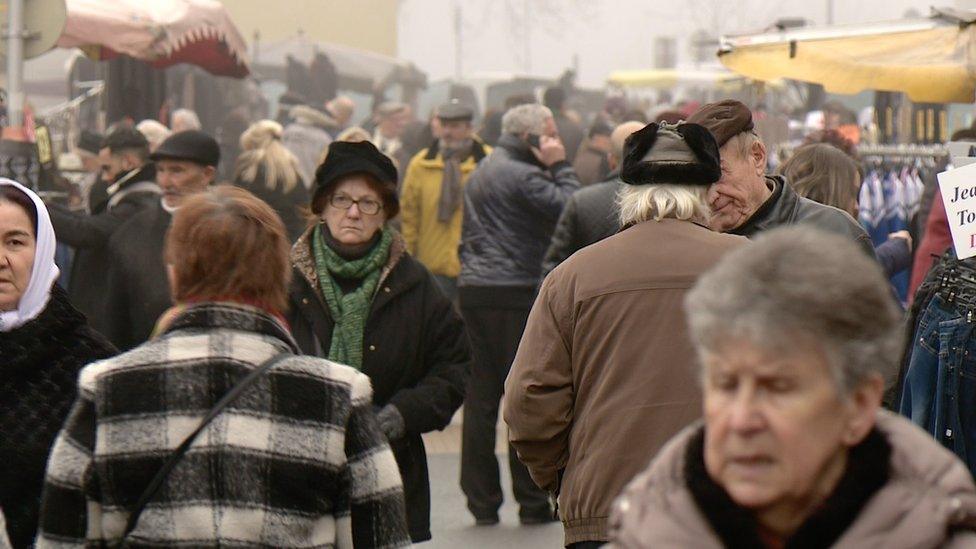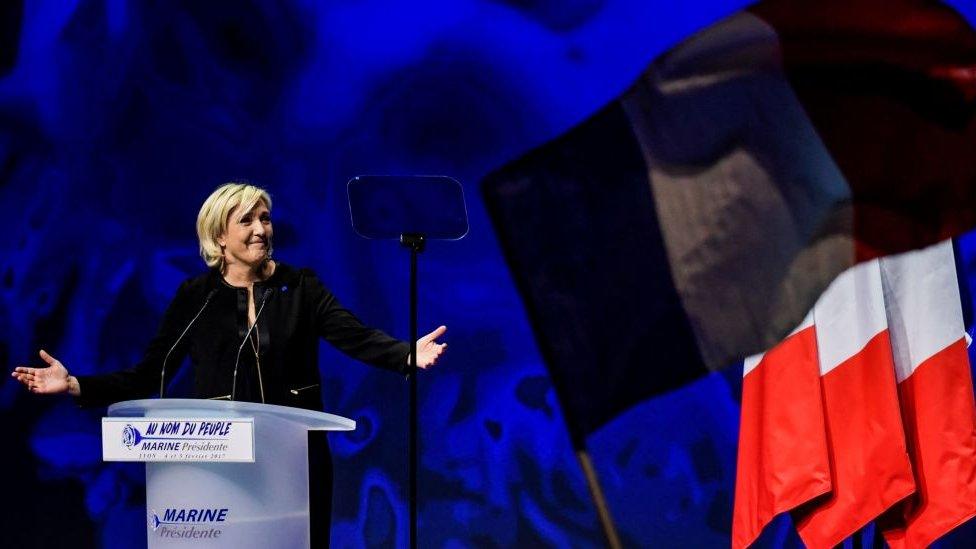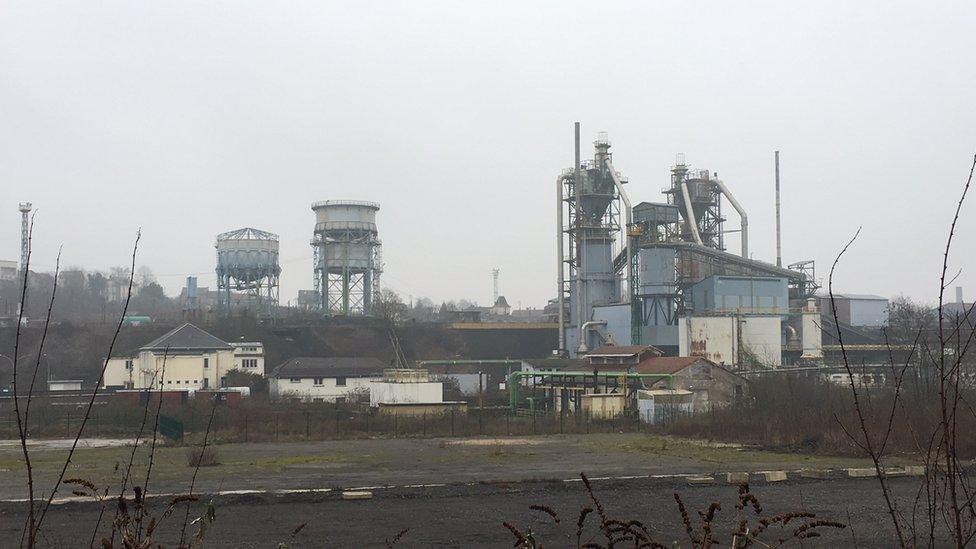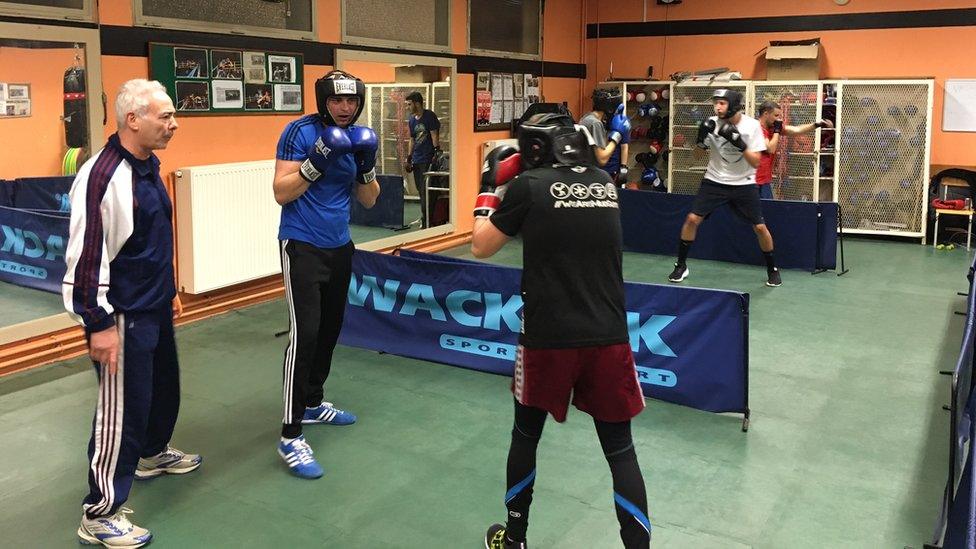How will blue collar France vote?
- Published

Hayange is not a place of metaphors, but the relics of its shuttered steel furnaces seem to signal something unresolved. They stalk the landscape around France's north-eastern villages, looming over a new political age.
This was once the thriving heart of France's steel industry. In the past decade, unemployment has risen by 75%, and around a quarter of the working population now crosses the border to Luxembourg each day for work.
This was once staunch left-wing country; communists and socialists ran this place together. But the past few years have seen left-wing votes shrivel, while those for the National Front (FN) have more than doubled, pushing it into the lead.
In the market, there are many who are happy to say they vote FN, though not always to give their name.
"I'm for the National Front. I'm not afraid to say it," one woman told me. "I'm not totally in favour of them but it's my way of saying that I'm not happy with today's politics.
"I think we've left the door open to too much immigration. Employment is in decline. We give, we give, we give to everyone. And I think that's why you chose Brexit, and I absolutely approve of that."
The National Front is promising France its own referendum on "Frexit" or exit from the EU, if it wins power in May. It's also promising to clamp down on immigration and give French people priority when it comes to jobs and housing.

Hayange is one of a number of towns controlled by Marine Le Pen's National Front
The National Front has never managed to win power at the regional or the national level, but now controls a dozen towns in France, including Hayange. And the man elected as FN mayor here, Fabien Engelmann, was once himself a union man from the far left.
The party presents itself as defending France's "forgotten ones" - against crime, immigration, and economic change.
"The left betrayed its voters, betrayed the workers, the middle class, the shop owners," Mr Engelmann told me. "There's also mass immigration today, and I think that after a while you can't welcome the poor from across the world. We have to stop this immigration and take care of our own."
France election: Far-right's Le Pen rails against globalisation
Emmanuel Macron: France's ambitious man 'on the move'
Fillon payment inquiry: What you need to know
But the election of Mayor Engelmann has been divisive here, partly because political loyalties themselves are dividing more sharply.
After years of trying to boost the economy by pushing through liberal reforms, the Socialist Party is deeply unpopular with many blue collar workers, who say they feel abandoned and ignored, as industries close and jobs become less secure.
It didn't help that, before he became president, Francois Hollande visited Hayange during his election campaign to promise that the blast furnaces here wouldn't close. They did.

Hayange's blast furnaces are now closed
After that, votes for the Socialist Party began to plummet, as supporters turned towards the political margins for answers - both the far left, and the far right.
Patrice Hainy was one of those converts. Fed up with the attitudes of France's more established parties, he responded to a National Front leaflet pushed through his door, and ended up joining the party, as a deputy mayor.
Patrice lives on one of the old steel-workers' estates, built here in the 19th Century by the wealthy family who built the industry from scratch. According to local historians, it was part of a new vision back then to provide workers with everything they might need from cradle to grave: hospitals, schools, canteens, even holiday camps.
Now Patrice, living in a relic of that industrial heyday, says it's the sense of being ignored that leaves left-wing voters open to the FN.
"I was attracted to them because the other parties don't listen to the people, and I believed the FN was listening to me," he explained. "It attracts weak members from the left. I was from the left and I was angry with our politicians who are sacrificing French people."
But within a year of joining the party, Patrice had left, disillusioned by what he describes as the National Front's "repression", and anti-Muslim views.
He's planning to vote for a left-wing candidate in the presidential elections this year, but says voters should not underestimate the appeal of FN leader Marine Le Pen.
"I think she might have a chance, because what is happening at a national level is what's already happened in my town," he said. "The FN voters go and vote, the others don't because they're so disgusted with politics."

Despite all the changes, the boxing club in Hayange remains open
The FN's fiercest critics, like nurse Gilles Wobedo, are trying to draw together opposition voices, to protest against what they see as divisive and partisan policies by the mayor.
"The National Front attacks democracy in this town," he told me. "For the past three years, they have divided people: young against old, Muslims against Catholics, workers against the unemployed. The mayor has divided the population and maintains his grip with a small majority."
But, he says, it's hard to build momentum because the opposition parties here are so divided - each hoping to win back power for themselves. Not too dissimilar to the problems the left is facing at the national level, with left-wing votes divided between three different figures in the presidential campaign: the socialists' Benoit Hamon, the far-left leader Jean-Luc Melenchon and the independent centrist Emmanuel Macron.
One relic of Hayange that has survived is its boxing club. A place for its young men to forget France's politicians, and learn how to win - and lose - for themselves. One of the boxers there, Frank, says a vote for the FN is still a vote of protest and desperation for many people here.
"On the left, we've had the Socialist Party in the past; but it doesn't work," he said. "So now, we would like to try something different. I think it's a last solution."
What if that solution also fails, I ask him?
He shrugs. In the ring, it's easy to judge promises against performance. In politics, it's often past performance that loses elections; and promises that win.